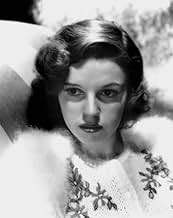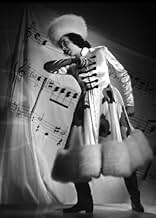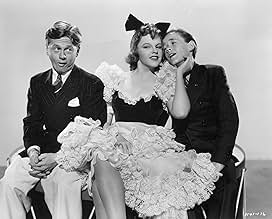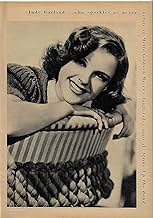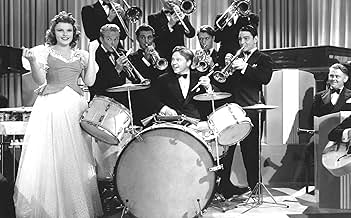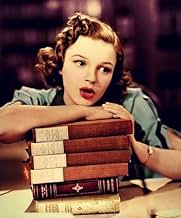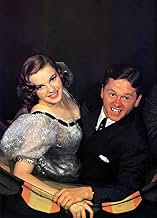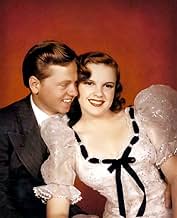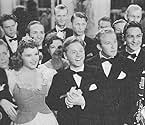Ajouter une intrigue dans votre langueA high school boy wants to become a professional musician, and his gal pal wants to become his best girl. They work together staging big band shows with fellow classmates in the hopes of hit... Tout lireA high school boy wants to become a professional musician, and his gal pal wants to become his best girl. They work together staging big band shows with fellow classmates in the hopes of hitting it big.A high school boy wants to become a professional musician, and his gal pal wants to become his best girl. They work together staging big band shows with fellow classmates in the hopes of hitting it big.
- Réalisation
- Scénario
- Casting principal
- Récompensé par 1 Oscar
- 4 victoires et 2 nominations au total
- Ice Cream Concessionaire
- (scènes coupées)
Avis à la une
To me, 'Strike Up the Band' is the second best of their four "backyard" musicals. Their best being 'Girl Crazy', the best paced of the four and with the best songs and choreography, even if the story is not as good as the rest of the film. Faring weakest is 'Babes on Broadway' ('Babes in Arms' was a slightly better film regardless of its bowdlerisation of the source material), that film gets a lot right still but is too sentimental, contrived and corny in places with some out of place patriotism and a sour-taste-in-the-mouth finale. All four are worth watching though, and all four are well above average films.
'Strike Up the Band' is not perfect either, its Achilles heel being the far too corny, melodramatic and ponderous middle third (a shame because the film is actually very well paced for most of it and then drags badly in the non-musical moments of the middle third). The dialogue warms the heart and moves sometimes but the silly corniness of some of it is cringe-worthy.
Lastly while the cast are mostly splendid, there is one exception and that is the terribly annoying June Preisser (just as much as in 'Babes in Arms'), enviously athletic dancing is not enough for an obnoxious character played far too broadly to unbearable degrees.
However, even when not in Technicolor, 'Strike Up the Band' still looks lovely in crisp black and white and with elegant production design. As said, on the musical front (production values, songs, vocal performance, arrangements, choreography and dancing) 'Strike Up the Band' fares significantly better. The songs are great, not as great as the scores for 'Girl Crazy' and 'Babes in Arms' but almost. The three best songs being the plaintive "Our Love Affair", the exuberant "Drummer Boy" and the barn-storming "Do the La Conga".
Busby Berkeley's direction and how he stages the songs are not quite as imaginative, witty or dazzling as some of his other films, but it doesn't come over heavy-handedly and it has charm, tenderness and energy, particularly in the aforementioned three songs. Unlike 'Babes on Broadway', sentimentality is avoided thankfully and is replaced by a lot of entertainment and heart-warming. The story is unexceptional but is full of energy, fun, heart and charm, palling only in the non-musical moments of the middle third.
Rooney and Garland make 'Strike Up the Band' especially worth seeing, they are both on top form and their chemistry irresistible. From personal opinion, of the four Rooney-Garland "back-yard" musicals (despite 'Babes in Arms' being the one to get the Oscar nomination) this contains Rooney's best performance of the four, his role really plays to his strengths and even stretches him in showing more talents that one never knew he had (i.e. didn't know he could play the drum so well). Garland is as ever radiant and deeply touching, "Our Love Affair" being one of the most poignant renditions of any song in a film she starred in (very near the top too, and the list is long). Paul Whiteman, not the "King of Jazz" for nothing, contributes hugely to the film's appeal too.
Overall, a thoroughly enjoyable film, a must for Garland fans and a must for anybody wanting to see what the fuss is about with her and Rooney together. 7/10 Bethany Cox
That was enough because the Mickey and Judy formula was by now established with Babes In Arms. Here the two are a pair of talented musical kids and Mickey is the drummer in his high school band. But he's got other things on his mind besides doing John Philip Sousa. Even Sousa did more than Sousa when he was leading a band. Mickey is filled with the new jive rhythms of the day and he'd like to use the other kids in the school orchestra to form a real band. He's got Garland in mind for the vocals and the object is to get an audition from Paul Whiteman.
Whiteman in his day may have appropriated for himself the title of King Of Jazz, but certainly no one did more to popularize the new American art form among white audiences. His orchestra was the training ground for many of later big band leaders. Leaders like Tommy and Jimmy Dorsey and Glenn Miller all who were sidemen with Whiteman and who kids like Mickey and Judy and the rest of the cast were listening to.
If Strike Up The Band isn't exactly let's put on a show, it still is let's put on a concert and Mickey and Judy do have some shtick to perform, their Gay Nineties spoof is quite good. Also the fantasy sequence of the 'fruit orchestra' doing Our Love Affair is also nicely done, it looks very much like Ray Harryhausen's claymation figures, but he wasn't involved with Strike Up The Band.
Strike Up The Band won one Academy Award for sound and was nominated for two others. Roger Edens and Arthur Freed wrote Our Love Affair which was nominated for Best Song, but lost to When You Wish Upon A Star. And Edens and Georgie Stoll were nominated for Best Musical Scoring.
Busby Berkeley directed the film and in the finale shows his fine hand for spectacle. Here's where the patriotism that Louis B. Mayer was seeking came out. Remember this was 1940 and a lot of people were very afraid the USA was going into another World War. The finale with the title song was the kind of rousing patriotic spectacle that Hollywood would be doing in every studio after December 7, 1941.
With Strike Up The Band Arthur Freed proved he was no flash in the pan as a producer. After 70 years the film holds up well and the talents of Mickey Rooney and Judy Garland reign eternal.
Le saviez-vous
- AnecdotesThe original camera negative was destroyed in May 1978 during a nitrate film fire in the George Eastman House archives. The fire also destroyed 328 other films' original camera negatives.
- GaffesIn an anachronism typical of movie musicals of the time, when Mickey and Judy's band wins the competition, it is announced that musicians, singers and dancers from the various competing orchestras will perform an impromptu big number together. Even though they've never met before, nor rehearsed, nor had even five minutes to create sets and costumes, everything comes off seamlessly and with M-G-M's usual level of polish.
- Citations
Paul Whiteman: Take that little fellow on the street. Teach him to blow a horn and he'll never blow a safe.
- ConnexionsEdited into Hollywood: The Dream Factory (1972)
- Bandes originalesStrike Up the Band
(1927)
Music by George Gershwin
Lyrics by Ira Gershwin
Played during the opening credits
Sung by Judy Garland (uncredited), Mickey Rooney (uncredited), and chorus in the finale
Meilleurs choix
- How long is Strike Up the Band?Alimenté par Alexa
Détails
- Date de sortie
- Pays d’origine
- Langue
- Aussi connu sous le nom de
- Armonías de juventud
- Lieux de tournage
- Société de production
- Voir plus de crédits d'entreprise sur IMDbPro
Box-office
- Budget
- 838 661 $US (estimé)
- Durée2 heures
- Couleur
- Rapport de forme
- 1.37 : 1
Contribuer à cette page



